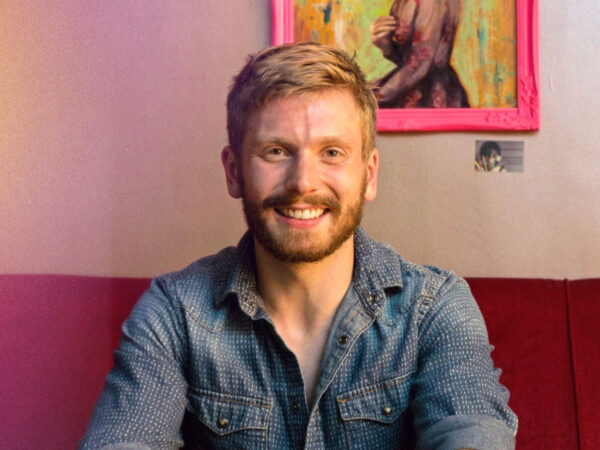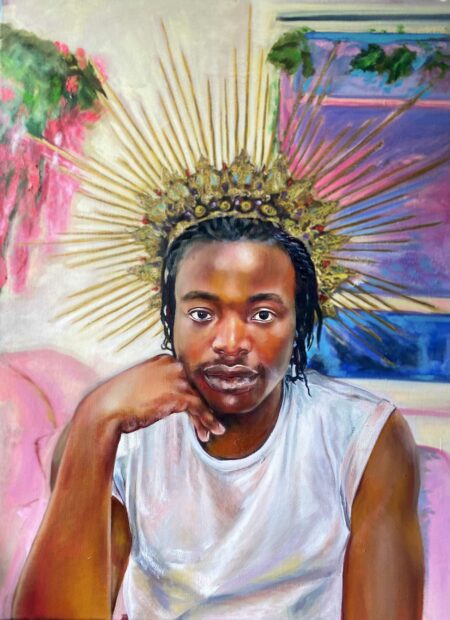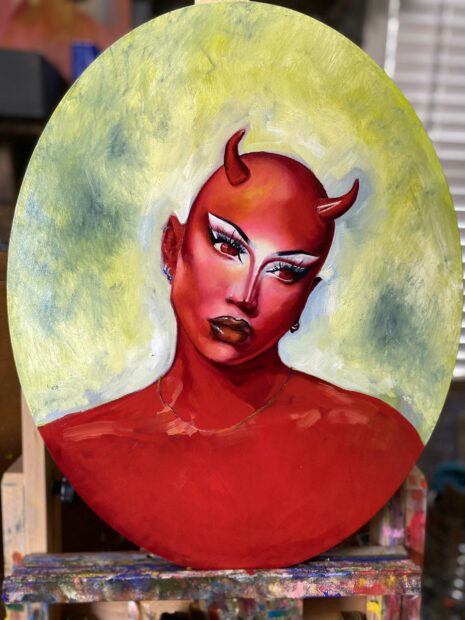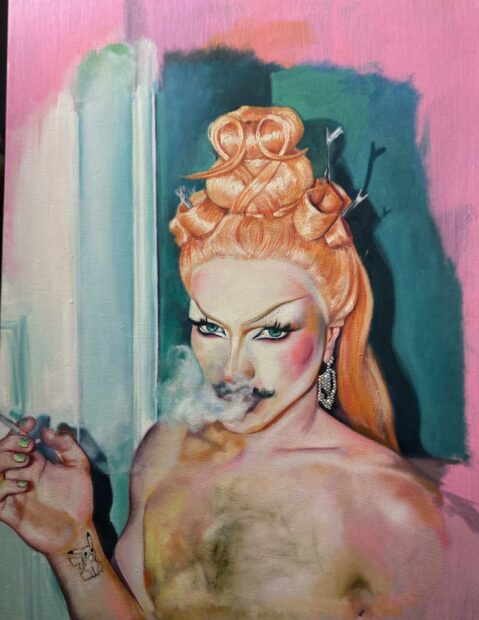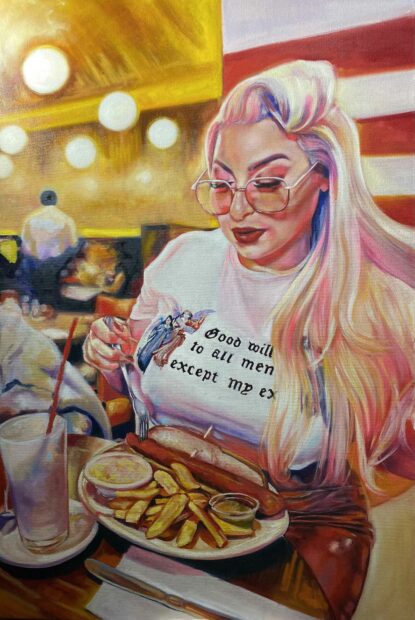Oliver Freeston is a classically trained ballet dancer who has performed everywhere from Russia to Japan. He initially began painting to decompress. Within six months of experimenting with acrylics, Freeston won BBC’s Big Painting Challenge, which he describes as a painting version of The Great British Bake Off. Originally from the UK, Freeston now lives in Watauga, Texas, with his husband. Amidst the backdrop of the Bible Belt’s discrimination against the LGBTQ community, Freeston paints bold portraits inspired by queer artists. In May, his work won the Madame F Queer Britain Art Award.
Freeston moves between insight and humor with easy fluidity. When I met him at a coffee shop, he ordered a chai tea latte with two shots of espresso. He took a sip, then set the cup carefully back down. “This tastes like fish,” he said, laughing a contagious laugh, and then taking a bite of a muffin.
Anna Adami (AA): Why is painting queer artists important to you?
Oliver Freeston (OF): If you go back through history and you look at art, what stands out are people pushing the boundaries of their time, and so many queer people now are doing that. During the pandemic, I started doing deep dives on Instagram and finding these queer people being genuine versions of themselves and their expression. Painting queer artists also made me realize more about myself. I never really felt comfortable in stereotypical gay communities. I thought, why is that? I think it’s because I’m more queer, or in a way — weird — than stereotypical. If that makes sense?
AA: Sure. The gay community might expect you to conform to specific standards, while the queer community offers more fluidity.
OF: Yeah, and the art forms that come from queer communities break down the boundaries we put on expression. I think that’s so cool.
AA: Could you talk about the colors you use?
OF: I love vibrant colors. I think everything needs to be a bit more colorful. Color can represent joy. Not always, but it does set a mood. To me, it feels celebratory. It’s nice to have something that brings joy. We all need that in life.
AA: Let’s go back to your origin story.
OF: I got bit by a spider.
AA: When did your creative inclinations begin?
OF: I was always drawn towards the arts. Growing up in England, after school I’d go to the vicarage and paint murals with the vicar’s wife. I really enjoyed that kind of stuff. I knew I wanted to do something in the arts. Then I started dancing when I was fourteen.
AA: What made you start dancing?
OF: My mum was trying to get rid of me one summer, so she sent me on a course in hip hop, which was hysterical, looking back. Just think of these little British villages filled with white people in the early 2000s dancing hip hop to NSYNC’s “Dirty Pop.”
The woman who taught the course had pictures all over her living room of ballet dancers. I asked, “Could I learn to do that with you?”
She was taken aback because had never had someone, especially a boy, interested in ballet. So she started teaching me. She changed my life.
At sixteen, I moved to London for vocational training at the Central School of Ballet, which was insane. Six days a week, from 7 a.m. until 3 p.m., of just ballet and contemporary dance. We were treated like twenty-something-year-olds when we were sixteen. That’s how to build in some trauma.
I tried visual art in school, but I had a lot of problems with the teacher. I didn’t paint again until 2016. At the time, I was performing in Secret Cinema’s Moulin Rouge. I needed something to do to decompress in the afternoon, something for myself. I bought these little five-by-six canvases and started doing acrylic portraits.
My mom was like, “You should do the ‘Big Painting Challenge,’” so I applied for it. I’ve always had bad imposter syndrome as an artist. When I got the audition, for some reason I got it in my head that I should paint with oils because I thought they were more professional. So I bought the cheapest set of oil paints from Amazon and I brought them to the audition. I had never painted with oil before the audition and I was like, “Oh my god, they’re not drying! All the colors are running together!”
Anyway, I got on the show. It was amazing. I learned so much. I’ve been painting ever since.
AA: Do you still feel that sense of decompression when you’re painting?
OF: Yes and no. I get excited about doing projects that inspire me. Being commissioned to paint something specific is a little harder. I have this ingrained perfectionism mindset that came from ballet. My brushes get smaller and smaller. I get obsessed with attention to detail instead of the bigger picture, bigger brush strokes, being more expressive with the paint.
AA: That image is a poignant metaphor for perfectionism — getting smaller and smaller in our expression.
OF: It holds us back. It’s also the perfectionism of our society. We learn forms should look a certain way. If they don’t, it’s wrong. But why are we saying something is wrong when it’s just different? It goes back to the queer thing again — why are we saying there’s a wrong way to be gay when there are just different ways? We don’t have to conform to the same mold.
AA: It was illegal to be gay in Texas until…?
OF: 2003, I think.
AA: In our lifetime. This is the context that we’re emerging from and you’re painting in.
OF: We’ve also had a huge knockback in the gay community because of the deaths in the AIDS pandemic. There’s a whole generation of artists that we lost who died in their thirties or forties. You think of how much more they could’ve done, what they could’ve taught and passed down to the generation after them. We lost that.
AA: Is there a reason you’re drawn to painting faces?
OF: Oh yeah, I think people are fascinating. I love trying to work people out. I can’t read them a lot of the time. Everyone is so unique and different. It makes me think of the soul — like our individual personalities have to be due to something more than the wiring of a brain.
I love it when people decide to live their lives. When they choose how to identify themselves. It makes me so happy. I mean it makes me jealous sometimes too. When I see performers like that, I think I’m not brave enough or I didn’t make the right decisions to live an authentic life.
AA: Maybe you just chose a different path. Or life chose a different path for you.
OF: (whispers) Texas… In San Francisco, I was more out there in how I dressed. I started self-editing more since I moved to Texas. I started thinking, “maybe it’s not appropriate to dress this way.” Painting might be my way of expressing things I’ve been repressing. Through my art.
AA: Where can people find your work?
OF: I’m working on updating my website, but my most up-to-date work is on Instagram @oliverfreeston.


